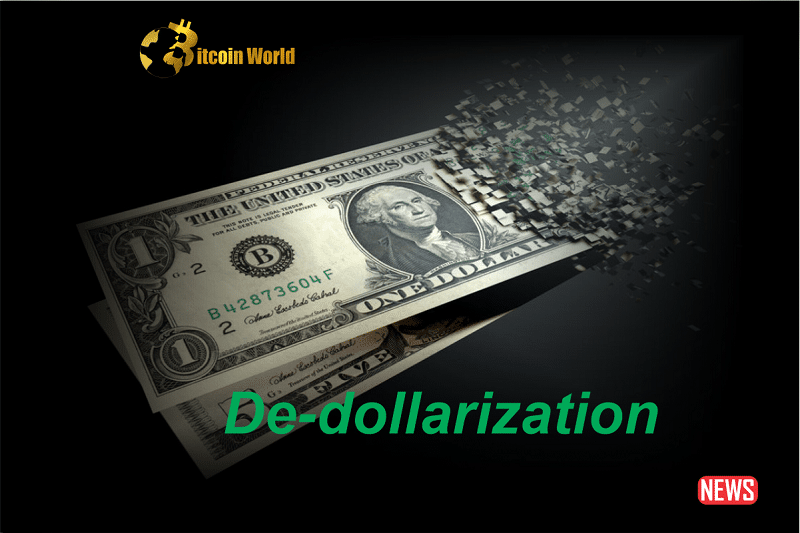Is the reign of the US dollar as the world’s reserve currency facing a significant challenge? According to Russian Foreign Minister Sergey Lavrov, the answer is a resounding yes. He argues that de-dollarization isn’t just a future possibility – it’s happening now, spurred by the very actions and rhetoric of the US government itself. Lavrov points to the increasingly active role of the BRICS alliance (Brazil, Russia, India, China, and South Africa) as a key driver in this shift. Let’s delve into what this means for the global financial landscape.
Why the Push for De-Dollarization?
Lavrov’s statements highlight a growing sentiment among certain nations, particularly within the BRICS alliance, to reduce their reliance on the US dollar. What’s fueling this movement?
- Concerns about US Policy: Lavrov explicitly states that US policies and pronouncements are the primary catalyst. Nations are wary of the potential for the US to weaponize the dollar’s dominance for political leverage.
- Safeguarding Financial Transactions: The BRICS nations are actively seeking ways to protect their financial dealings from potential external pressures and sanctions.
- Building an Alternative System: The upcoming BRICS summit in August will focus on strengthening the alliance’s New Development Bank, aiming to insulate it from actions perceived as hostile by the US.
Russia’s Experience: A Case Study in De-Dollarization
For Russia, this isn’t just a theoretical discussion. Facing significant Western sanctions, Russia has been actively working to diversify its financial relationships. Lavrov argues that the West’s attempts to isolate Russia from the global financial system have ironically accelerated the move away from the dollar.
Consider this:
- Reduced Dollar Usage in Trade: Russia has been increasingly settling trade in other currencies, particularly with its BRICS partners.
- Focus on National Currencies: The emphasis is shifting towards using national currencies for bilateral and multilateral transactions.
What are the Potential Impacts of De-Dollarization?
If de-dollarization continues to gain traction, the ramifications for the global economy could be substantial. Let’s explore some potential consequences:
Shifting Power Dynamics
Could de-dollarization reshape the balance of power in international finance?
- Reduced US Influence: A decline in the dollar’s dominance could lessen the US’s ability to influence global economic policy.
- Rise of Alternative Financial Centers: Other economic blocs and currencies might gain prominence.
Implications for International Institutions
What role will institutions like the IMF and World Bank play in a de-dollarized world?
- Potential for Reform: The existing structure of these institutions, heavily influenced by the US, might face pressure for reform to better reflect a multipolar world.
- Emergence of New Institutions: Organizations like the New Development Bank could play a more significant role.
Impact on National Monetary Policies
How might individual nations adjust their monetary policies?
- Increased Use of National Currencies: Central banks might prioritize managing and promoting their own currencies for international trade.
- Diversification of Reserves: Nations might diversify their foreign exchange reserves beyond the US dollar.
Challenges and Considerations
De-dollarization is a complex process with potential hurdles:
- Establishing Trust and Stability: Building trust in alternative currencies and financial systems takes time and effort.
- Liquidity and Convertibility: Ensuring sufficient liquidity and ease of conversion for alternative currencies is crucial.
- Geopolitical Factors: International relations and political dynamics will significantly influence the pace and extent of de-dollarization.
Examples of De-Dollarization Efforts
While a complete shift away from the dollar is a long-term prospect, we’re already seeing examples of this trend:
- Bilateral Trade Agreements: Countries increasingly engaging in trade settlements using their own currencies.
- Development of Alternative Payment Systems: Efforts to create payment systems that bypass the SWIFT network.
Actionable Insights: What Does This Mean for You?
While the average individual might not directly engage in large-scale international transactions, understanding the trend of de-dollarization is important:
- Stay Informed: Keep abreast of global economic developments and the evolving role of different currencies.
- Consider Diversification: For investors, this might mean exploring opportunities in markets and assets beyond those solely tied to the US dollar.
Conclusion: A Shifting Global Financial Order?
Sergey Lavrov’s remarks underscore a significant trend: the growing momentum behind de-dollarization. Driven by a desire for greater financial independence and concerns about US economic policies, the BRICS alliance, with Russia at the forefront, is actively exploring alternatives to the US dollar. While the dollar’s dominance won’t disappear overnight, these developments signal a potential reshaping of the global financial order, with far-reaching consequences for international trade, monetary policy, and the balance of economic power. The coming years will be crucial in observing how this shift unfolds and the long-term implications for the world economy.
Disclaimer: The information provided is not trading advice, Bitcoinworld.co.in holds no liability for any investments made based on the information provided on this page. We strongly recommend independent research and/or consultation with a qualified professional before making any investment decisions.




